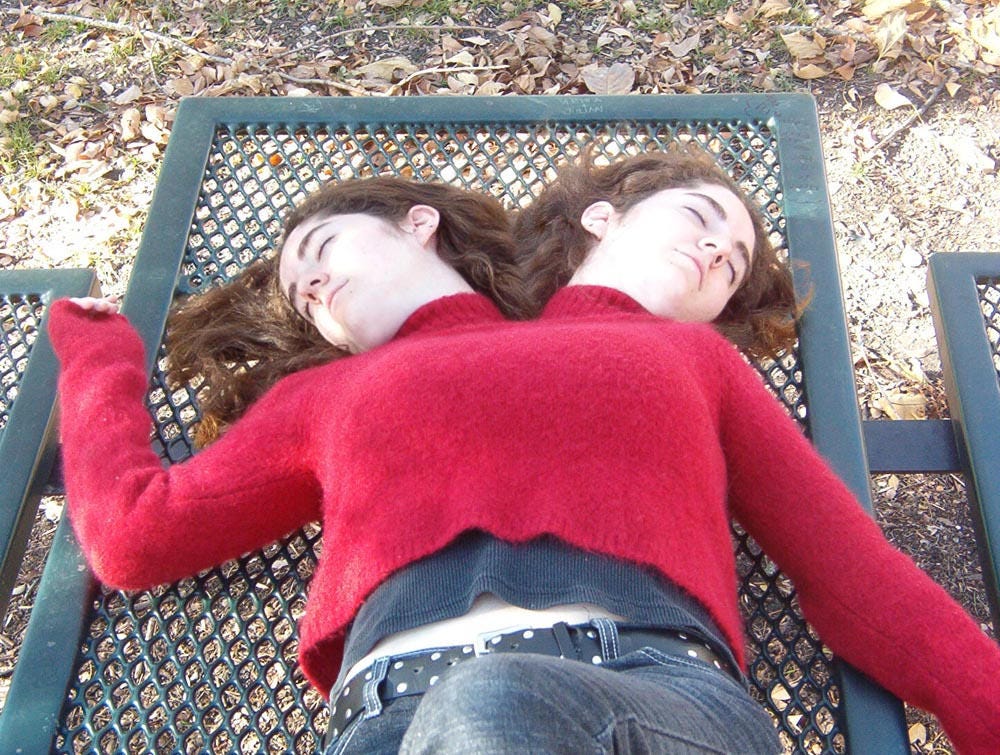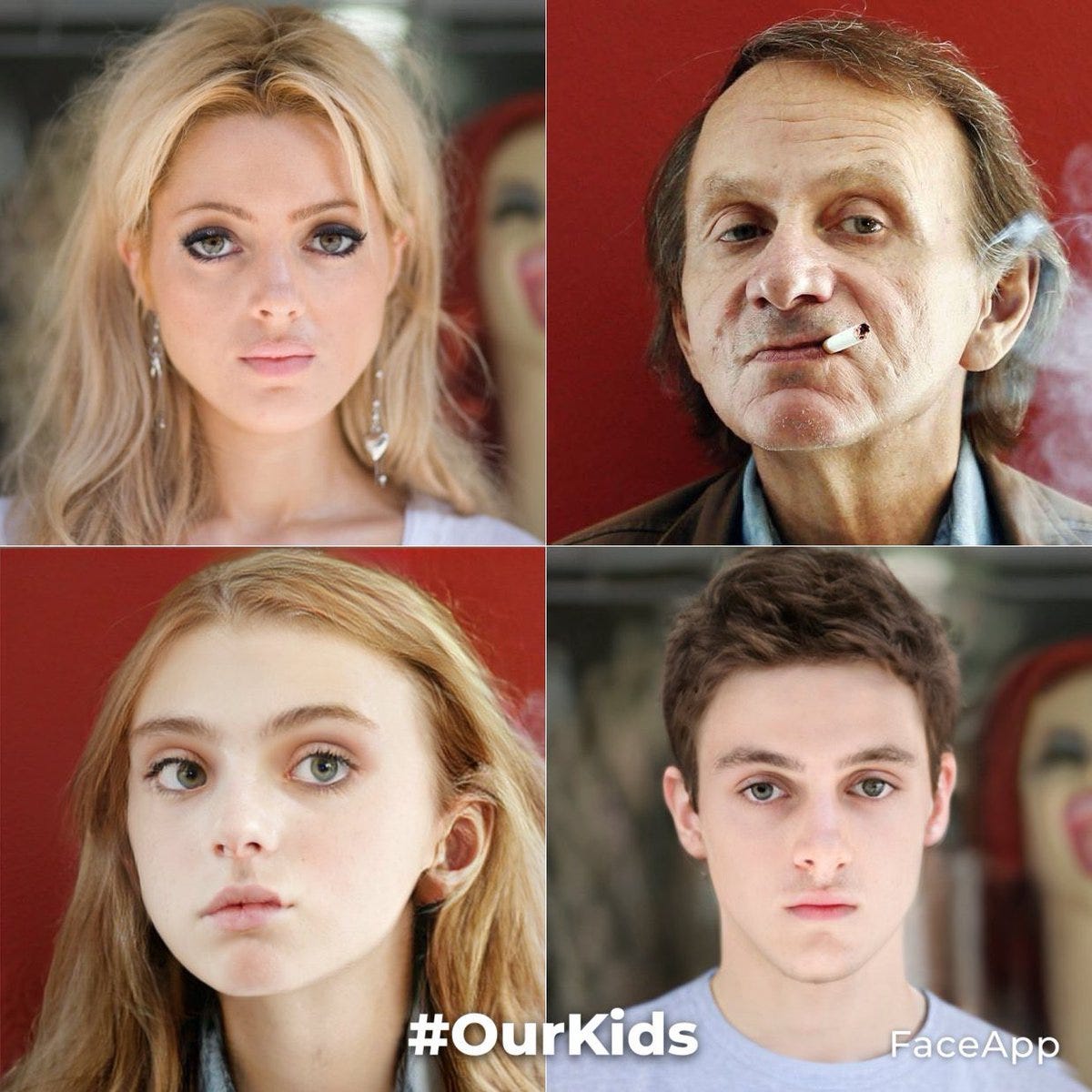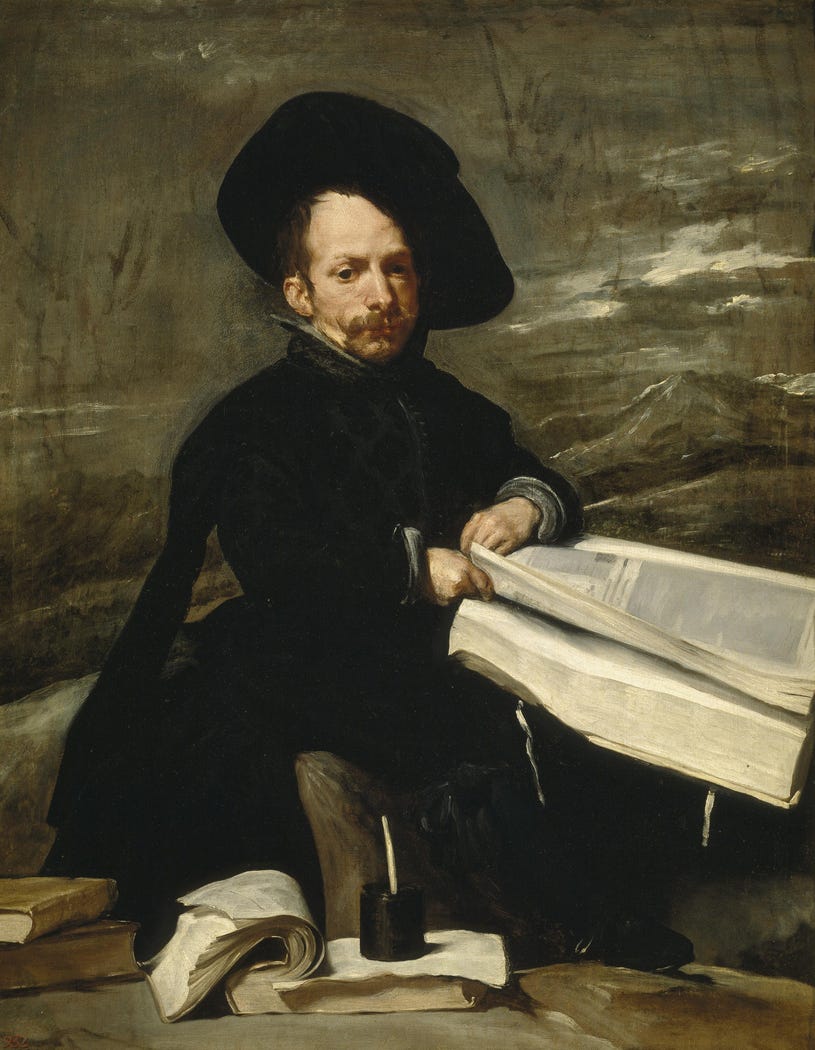ANTIGONE HAS TWO HEADS
Comments on the mitigation principle, including an analysis of Simone Weil's final letters.
THE EUOLOGIES OF INTELLIGENCE
To get there—to get to Antigone’s two heads—let’s take what might look like a detour and read Simone Weil’s final substantial letter, written to her parents from London on 4 August 1943. The first half of the letter is about a young cockney girl and English desserts, ‘fruit fools’. Weil then segues into ‘fools’ in Shakespeare, who she calls ‘Sh.’. Here is a cross-section of what she says, exactly 20 days before dying in Ashford, Kent:
Even Kent and Cordelia [in King Lear] attenuate, mitigate, soften and veil the truth . . . Fools are the only people who tell the truth. All the others lie . . . And my reputation for ‘intelligence’ is practically equivalent to the label ‘fools’ for these fools.
These fools in question, as opposed to the historical Shakespearian ‘fools’, are people who pass over intelligence quickly, dismissing what is said as excellent without considering if it is really true. She clarifies:
The eulogies of my intelligence are positively intended to evade the question: ‘is what she says true’?
That is, there is a determinable intentional meaning in the eulogies of intelligence and it comes down to the prohibition of the question of actual truth. As Weil says in another parental letter, this time on 18 July the same year,
Some people feel in a confused way that there is something. But once they have made a few polite remarks about my intelligence their conscience is clear. After which, they listen to me or read me with the same hurried attention that they give to everything.
The figure of the one who reads and praises and yet effectively ignores is a recurrent one in these final letters of Weil’s, and her insistence might be taken as an analytic comment on the impossibility of reading. Whatever we say, it is in effect never heard. Whatever we write or post, it is in effect never read or taken in. I can always rest assured that no reading will have ever taken place.
We also might want to call this figure of the unreader the mitigator. In the case of the very final letter it is only the ‘fool’ who can break away from the problem of what might be called in a wider sense ‘mitigation’.
It is as if one of Weil’s final thoughts really is directly to do with this strong distinction marked by quotation marks between a ‘fool’ and a fool. Already here in the doubling of terms of retardation we have something like two bodies or even heads, as we will see in a moment.
KINDNESS OF NONDELAY
Weil admits that she has not read the whole of Shakespeare, and that perhaps there are counter-examples. In fact, in Shakespeare the problem of mitigation is there in complex ways, since the characters who deliver the worst news are often freighted with a strange type of loveliness. That is, they are also tracked and waylaid by a kind of rhetorical retardation. One thinks for example of Sir Stephen Scroop in Richard II, who claims to ‘play the torturer, by small and small / To lengthen out the worst that must be spoken’. Scroop takes his time and breaks up the bad news into morsels, all the better to ‘soften the blow’ by giving something like duration and thickness to the worst. (This, by the way, is precisely what Weil indicates in the letters can never be done: ‘I cannot distribute it piecemeal.’) Even a certain amount of sadism (torture) is implied by Scroop so that the worst can be saved till last—so that it can be lengthened and deferred and differed.
In Weil’s consciously limited reading of the plays, on the other hand, such subtleties are placed to one side. Kent and Cordelia do not partake of this more complicated-looking and supposedly tender temporal act. Scroop’s loveliness in delay is replaced by a more ultimate distinction between ‘fool’ and fool. In Weil, given all resolute urgency and clarity in what must be felt to be a final letter, playing the torturer would be just that: the sadism of genuine delay and liars. Given time’s timing out, retardation is for fools but not for ‘fools’.
JESTER THEORY
To demonstrate what she means she next turns to painting and to Velázquez’s fools:
Is this also the secret of Velázquez’s fools? Are their eyes so sad because of the bitterness of possessing the truth and having won at the price of nameless degradation the power to utter it and then being listened to by nobody (except Velázquez)? It would be worth while to look at them again with this idea in mind.
Again, nobody listens (except the creators themselves, in this case the Spanish painter). Turning to the letter of 18 July, after commenting on a growing certainty about ‘a deposit of pure gold which must be handed on’, she says to her parents:
Only I become more and more convinced, by experience and by observing my contemporaries, that there is no one to receive it.
Whatever the growing certainty was for her (the unwavering nature of god and the centrality of the beauty of the entire universe as a principle of universal ‘gold’, perhaps), there was an equal certainty in the final letters that nobody could ever be in the position of a genuine sharer. Rather than isolation, we might take this to be a pressing home of scriptural muteness and the primacy of the universe as secret (signs for this can be found throughout Weil’s work).
Velázquez is capable of listening to his own fools and their truths through painting, as if in standing before his subject and taking time with it he listens to a face.
The price the fool/jester has paid is hidden and so can perhaps only be seen as a painted face: ‘the bitterness of possessing the truth and having won at the price of nameless degradation the power to utter it’. The nameless nature of the fool’s abjection precedes them and is ‘worn lightly’, being the essence that allows them to speak in the way they do.
INTRA-MITIGATION
Mitigation also has an intra-psychic dimension to it. In Antigone one of the two sisters has the bitterness of possessing the truth on her side as a power and the other is more of a latecomer, which is to say a mitigatory one. Between them there is a forcefield of conflict, advance and refused negotiation. Antigone and Ismene are exactly like Justine and Claire in Melancholia (2011), except that Antigone never relents as Kirsten Dunst does when she mysteriously softens to close things out. Antigone makes no tepee without canvas in the final moments like Justine does in the exact juncture when the planet is obliterated by its double. Or rather in being buried alive in a cave (Weil explicitly compares it to a crucifixion in her notebooks), Antigone goes into a solitary tepee meant to neither protect nor expose, as it were, nobody.
The extreme violences of Antigone are perhaps little discussed, even now. The image of Antigone buried alive has literally not been given. We can blame Sophocles for this if we wish. He himself doesn’t provide the image (can’t according to the etiquette of Greek theatre) but it is nonetheless implied by its own strange absence. At the same time, if we play the true fool we might say that this absence has rarely if ever been filled in, including by implication. Where is Antigone’s death? When we think of the end of Antigone we tend to think of a blank. She has gone all the way, yes, but it is hardly worth imaging what she actually committed herself to. Or is it? Perhaps the final irony is that in a play triggered by the lack of appropriate burial of a brother no image may be given of the burial-alive of the ‘fool’ sister herself. Was Antigone buried at all?
ANTIGONE HAS TWO HEADS
Hölderlin seems to compact the entirety of the violent vibration of Sophocles into a single so-called ‘monstrous’ gesture right at the head of his translation of the play. Here is the first line, which we’ll leave without translation for the moment:
Gemeinsamschwesterliches! O Ismenes haupt!
In general let’s say—such is our somewhat monstrous bet—that this is when Hölderlin asserts that Antigone is (more than) a single head. The compound word exclamation Gemeinsamschwesterliches! followed by the direct address to Ismene can mean many things as an ensemble if we want it to, but perhaps the most literal way of understanding just how far Hölderlin was prepared to go in saying what Antigone was saying in all its violence is by iterating this: Antigone has two heads.
O Ismenes haupt: this literally refers to what might be called in abbreviated form Ismene-head. By addressing Ismene as a head (haupt) after using the conjoined word Gemeinsamschwesterliches! a definite and hallucinatory sense is given of Ismene being not just of the same house and sorority-blood but of the same head.

Here is a first translation of Hölderlin’s line then:
O my shared sisterly head of Ismene!
But what we really mean is perhaps this, unless we simply want in 2021 to ignore the excessive nature of gemeinsamschwesterliches:
Full whole ass head head! O Ismene co-head!
Or even something like:
Lol frr double headed sister of mine, my own full head ass ass doublehead!
Few are the exegetical ‘fools’ who have focused on the literal sense of this at the expense of their own actual sustainable meaning, just as Hölderlin and Weil did. George Steiner goes some way towards it in the weaker form of an exegetical eulogy in his book Antigones, the title already indicating a twoheadedness but also an overshooting (Antigone is not a figure of sheer multiplication—Antigones—but of the important horror of the two!!). Steiner starts with requisite bluntness:
Why does Antigone invoke Ismene’s ‘head’?
At the level of the unabated literal, this is the whole point. The shock is in the actual reference to a head, no doubt exactly like we use ‘head’ to name someone now in way that as if makes their whole being a head, especially when meant affectionately. But why the head? Steiner might have straightaway noted what is really said. That is, why does Antigone invoke two heads? Or rather, why the hallucination of two heads conjoined? Why does Hölderlin’s Antigona say in its very first line (at its head) that Antigone has two heads and why, following Weil, is it the case that nobody will see or say this even when they see or say it, like now?
ANTIGONE’S HATRED OF HER SISTER
It is perhaps worth repeating some more of Steiner’s eulogies of commentary. But we can propose something else in the meanwhile, and it has to do with Antigone’s hatred of Ismene. In fact, it may be that this thing also hasn’t been said before and certainly in its purity it seems unlikely that it doesn’t need repeating: Antigone hates her sister. Antigone hates Ismene and her hating Ismene has to do with being-of-the-same-head-but-Ismene-not-recognising-or-being-able-to-recognise-this. If there is what Weil calls a mine of gold in Antigone herself, it seems certain that there is no one to receive it, including Ismene who is even prepared to die in the same way for the same truth after some delay.
That delay is everything. Antigone’s concern is not with whether Ismene will agree with her decision to bury their brother but with whether she is already of the exact same mind, and if not why not? The issue is whether one has the same head now. Perhaps more subtly, it seems at the start of Antigone—and this is more concretized by the first line of Hölderlin’s Antigona—that Antigone is testing Ismene. Antigone is checking to see if Ismene knows, testing her to see if they are at the same time the same gemeinsamschwesterliches.
If you read Antigone in grand literary terms as the most well-known play in the whole of Western literature—more so than Hamlet for example—then you might also add that what is repressed at its head, what is headed off there, is Antigone trolling Ismene for not understanding in advance what primal two-headedness means. Hölderlin says this absolutely and literally and then centuries pass in which the meaning is ignored again and again all the way through and beyond the present moment of this reading right here.1
SISTER HATE
Antigone’s hatred of Ismene is strongly implied first of all by her playing a kind of trick on her at the very start of the play and then after that in the fervour of her refusal of all help. But it is also there explicitly in the text:
Dear God! Denounce me. I shall hate you more
if silent, not proclaiming this to all.
This is the moment when Ismene says that if Antigone really must go ahead with her act, she should at least keep it secret. It is here that inverse-philia comes to the fore. It is more important to Antigone for her act of burial to be unhidden than to stay close to her sister and follow her advice. I already hate you, she says, but I will hate you even more if you do not disclose this burial to all.2
NOBODY SPEAKS LANGUAGE
There’s a primal way of saying what the real Antigone is saying:
nobody speaks language
Nobody speaks language: somehow Antigone knows in advance that Ismene won’t know even if she knows. There is a kind of sublimely mad Cartesian hyper-solipsism here, but only insofar as we understand such a solipsism straightway to be something else. Namely, what Antigone understands just as in Weil’s final letters is that the most one can say is this strange fact that what happens is that nobody understands and nobody speaks language at all! As soon as Antigone goes in the direction of Ismene, she’s not the same mind. This doesn’t mean that Antigone (Weil) understands anything at all even so. Rather, what she understands is the only thing worth knowing, that however many times we say something nothing happens in it and with it. The only thing worth saying is the principle of unreading.
Take some of the lines of Elizabth Wyckoff’s translation, here the very opening lines, as an example:
My sister, my Ismene, do you know
of any suffering from our father sprung
that Zeus does not achieve for our survivors?
We can read the traces here of Hölderlin’s conjoined obsession. My sister, my Ismene: Wyckoff manages to imply what Hölderlin says through the acute possessive. But the intent of the whole opening line is the testing we spoke of. Antigone has heard the news about the two brothers (one buried, one not) but she isn’t open about the fact. She is checking not that Ismene knows but that she does not know. She has already disbanded her sister on the way to live burial. The phrases my sister and my Ismene give no sense of coinjointure as an ontological problem and in fact as an artificial intelligence problem. For example—and here we accelerate—what the genealogical inquiry of collective artificial intelligence broadly means in advance is knowing that if ‘I’ were to make a decision to be uploaded, why should that take place monadically? There is essentially no limit to the number of entities ‘I’ could be and the first primitive sign of that in Greek tragedy might be said to be this specific two-headedness. ‘Two’ would now mark a movement in which there is no upward limit to the number of heads and the faces that can be placed into or onto other face-heads.

One can see now why much of Antigone’s speech when conveyed by Hölderlin is so morphologically exaggerated and why that is its prime mode. What is pre-empted by the fact that Antigone has two heads is the genealogical challenge (#OurKids, FaceApp) of how identity-uploading is to be managed, in which there is no reason first of all that I have one head and then after that no reason I need to be one at all, which is to say there is no real reason I need to be me or you or for that matter be at all. This is why in another crucial moment Antigone rejects Ismene’s help even as a theoretical prospect that might have been there in advance. One might say that this is the pure moment of anticipated collective empty speech that Weil was aware of in the impersonal style of everything she wrote towards the end. Be the universal, Weil says, or don’t bother to speak at all. Wyckoff:
I wouldn’t urge it, and if now you wished
to act, you wouldn’t please me as a partner.
The outright rejection of Ismene’s twinning, which Ismene will go on to offer but by definition too late, is not a casual rejection of a psychological monad who won’t come close enough but the meaning of the fact that collective intelligence is being emptily and absolutely anticipated. Ismene would never have pleased Antigone as a partner because they are not (yet) part of the same undreamt-of (and blank) head.
THE WILLED MONSTER
Steiner says a number of things, then, which clarify in this respect:
The opening word of Antigona is a willed monster: Gemeinsamschwesteiliches! The adjective constitutes a visual, auditive, semantic welding of all the connotations of sorority, shared destiny, blood-relation, forced ‘oneness’, which are set out serially and discretely in the Greek. And where ordinary translators seek circumlocution and some ‘rational’ idiom of affection, Hölderlin is nakedly literal: 0 Ismenes Haupt! It is Ismene’s ‘head’, with every implicit physicality and ‘primitivity’, to which Antigone turns and addresses her fatal plea.
Because Steiner is a professional he is unable to say what Hölderlin actually makes Sophocles say, which is that Antigone is addressing the artificial conjecture/conjointure of a double-head-ass and that this anticipates what collective intelligence would have made take place in what would then have been called ‘us’. When Weil writes what we can take to be her final letters, we can recall that they are addressed as quasi-perversely open genealogical moments: they are letters to her parents as one-dual-identity. ‘Darlings’, she says, and then proceeds to say things which perhaps only a sheer genealogy in all its implied collectivity can be imagined to contain.
We are talking about the centuries, rereading the final letter of Simone Weil again: ‘Everybody, including Sh.’s readers and audiences for four centuries, is unware what they [the ‘fools’] say is true.’ As Paul de Man also said on the same wavelength, ‘in the whole reception of Kant for three hundred years, nothing happened, only regression, nothing has happened at all.’ Has anything happened yet in terms of hearing ‘fools’ in the last three or four hundred years? I think the answer is clear.
She goes even further: ‘If that’s your saying, I shall hate you first, / and next the dead will hate you in all justice.’





andrea crespo
I was interested in the first time you brought up Antigone do u read other things too